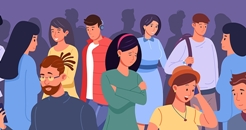 3 reasons you may struggle with close relationships
3 reasons you may struggle with close relationships
From an article by Mary Giuliani
Mary Giuliani was raised in a chaotic alcoholic home and witnessed long-term domestic abuse. She began using food to cope at 5 years old and was bullied at school about her weight. At 16, she was introduced to drugs and alcohol. By the time she got sober at 27, she weighed over 136kg (21 stone). She has since lost weight, become a trauma coach and has written a book, "It’s Not About Food, Drugs, or Alcohol: It’s About Healing Complex PTSD".
With wisdom from her lived experiences and study, she discovered three reasons as to why finding and maintaining close friendships and fulfilling romantic relationships seemed to be so challenging for her.
She had no idea that she had been navigating her relationships with a nervous system and psyche full of emotional landmines, constantly on the alert and ready to go off at the slightest hint of danger. Close relationships are stressful for survivors because their brains were wired to expect stress since this was what they experienced growing up with their family members.
The three reasons that she struggled with close relationships are:
1. Holding A (conscious or unconscious) “People Aren’t Safe” Worldview
Learning that childhood trauma is relational trauma helped explain why she struggled so much with social anxiety. All her relationship experiences growing up were with people who were hurting, judging, or condemning her. This taught her that people weren’t safe since they were the source of her deepest pain.
Her ”People aren’t safe” worldview significantly impacted her ability to connect with new people. When you don’t feel safe with someone, a stress response gets triggered in the body, making you anxious and uncomfortable. As a result, you feel the impulse to distance yourself or leave for self-protection. Understanding this response has been extremely helpful. When it comes up, she challenges her assumption and asks if it’s true or if it’s just an old default stress-response program running.
2. Being Sabotaged By Emotional Flashbacks
Emotional flashbacks are a common C-PTSD symptom. They don’t need to be over the top and dramatic. A C-PTSD emotional flashback can be a noticeable shift in your mood from being calm to becoming anxious, agitated, overwhelmed, sad, ashamed, or panicked. It can range from subtle to more pronounced and last for various lengths of time.
Examples of her flashbacks are:
-
Social anxiety. Frequently feeling the impulse to leave social events soon after you’ve arrived. This is an emotional flashback to the “people aren’t safe” worldview.
-
New relationships. If there appears to be the possibility of a close friendship, discomfort can range from mild to extreme. This trigger goes back to being shamed, blamed, and drained by her mother. If someone isn’t healthy for her or isn’t willing to respect her boundaries, she knows she doesn’t have to include them in her life.
-
Conflict. she gets especially triggered when people attempt to manipulate her with shame or guilt, are overly needy, judgmental, or get angry with her. She can also become triggered by witnessing people having emotionally or physically abusive arguments, a parent shaming a child, couples fighting in front of children, or excessively angry people.
-
Fear of Abandonment. The most intense emotional flashback is when she fears being abandoned in a close romantic relationship. It’s extremely tough to calm down after a conflict or fight with her partner until they resolve their differences. This is connected to the overwhelming pain of the chronic emotional abandonment she experienced as a child. Instead of staying in a reactive state, she tries to calm down by bringing in her wise inner parent to provide comforting, compassionate, reassuring support to her scared, hurting inner child.
3. Difficulty Leaving Unhealthy or Unfulfilling Relationships
Another common aspect of relational trauma is that many survivors find it difficult to leave unhealthy, abusive, or unfulfilling romantic, platonic, or work relationships. When Mary got into recovery with co-dependency, she did a lot of work on healing her ability to choose healthy relationships and, when necessary, leave unhealthy ones.
Interestingly, if parents stay together despite having an unfulfilling, toxic, or abusive relationship, their children learn that this is how relationships are supposed to work. As a result, they’re automatically drawn or attracted to partners and friends with similar dysfunctional relational styles. This is due to humans feeling drawn to people who feel similar to those they experienced growing up.
Engaging in Healthy Relationships Is the Best Way to Stay Regulated
Countless studies show that the best way for human beings to regulate their emotions and nervous system is to engage in healthy, close relationships. This is known as co-regulation. Unfortunately, intimate relationships often trigger stress responses in survivors, making them want to avoid close relationships.
This is why many survivors choose relationships with dogs, cats, or other pets versus people because animals are the safer alternative. It's well documented that dogs and cats can be very therapeutic because of the deep soothing connection they provide for their owners. Although Mary is all for connecting with pets, the deepest level of trauma-healing and connection for her has come through moving through the ups and downs of her relationship with her partner and close friends.
It’s important to know that you can experience profound healing in your capacity to be in intimate relationships through healing relational trauma.
Read the full article here.
Retweet about this article:
From an article by Mary Giuliani, 10/05/2023